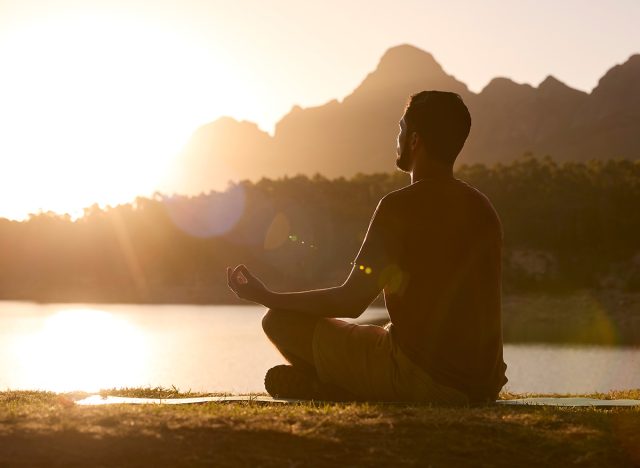8 Natural Ways to Lower Stress Levels Now

As a healthcare professional, I've seen firsthand how stress can impact our lives. We've all been there – heart racing before a big presentation, mind buzzing with a never-ending to-do list, or lying awake at night worrying about tomorrow. While a little stress can be helpful, pushing us to meet deadlines or tackle challenges, too much of it can really wear us down.
I'd like to share with you eight natural ways to lower your stress levels that have worked wonders for me and my clients. These are simple, practical tips that you can start using today to feel calmer, more balanced, and happier overall. Everyone's journey is different, so feel free to try these out and see what works best for you.
Stress Is Your Survival Mechanism

Stress is often seen as the enemy, but it actually plays a crucial role in survival. In moments of danger, stress triggers the fight-or-flight response, releasing hormones like adrenaline and cortisol that prepare your body to respond quickly. This mechanism has been essential throughout human history, helping our ancestors react to threats and challenges in their environment.
Short-Term Stress Could Be Good…

In moderation, stress can help you stay focused, alert, and ready to take on immediate challenges. For example, short bursts of stress—like preparing for a big presentation or meeting a deadline—can sharpen your concentration and increase your performance. This is often referred to as "eustress," a positive form of stress that can be motivating. However, when stress becomes chronic—lasting days, weeks, or even months—it starts to negatively impact your health.
…But Chronic Stress Can Be Devastating

Elevated cortisol levels, for example, can interfere with sleep, digestion, and immune function, leading to a variety of mental and physical health problems over time. Chronic stress is linked to anxiety, depression, weight gain, and even metabolic conditions like heart disease.
Now, let's dive in and discover how we can reduce stress and live our best lives. Here are the top eight ways to reduce stress:
Practice Deep Breathing: Calming the Nervous System

Why It Lowers Stress:
Deep breathing activates the parasympathetic nervous system, which counteracts the stress-induced "fight or flight" response. By lowering heart rate and reducing cortisol, deep breathing helps foster a sense of calm almost instantly.
Tip:
- Try the 4-7-8 Breathing Technique: Inhale through your nose for 4 seconds, hold your breath for 7 seconds, and exhale through your mouth for 8 seconds. Repeat for 2-5 minutes to quickly relieve stress.
How to Do It:
- Set a reminder on your phone to practice this technique twice daily, such as in the morning before you start your day and again before bed. You can also pair this practice with a calming activity, like listening to soft music or sitting in a quiet room.
Get Moving: The Stress-Relieving Power of Exercise

Why It Lowers Stress:
Exercise promotes the release of endorphins, which are the body's natural mood elevators. Over time, regular physical activity also reduces cortisol levels, improves sleep quality, and enhances your mental outlook.
Tip:
- Start Small: Aim for 30 minutes of moderate activity most days of the week. Walking, swimming, or dancing are great options. If time is short, consider quick bursts of activity, such as 10-minute walks or desk exercises.
How to Do It:
- Schedule Exercise: Add "walking Wednesdays" or "movement Mondays" to your calendar. Join a local walking group or invite a friend to exercise with you for accountability. Start with achievable goals, like a 10-minute walk during lunch, and gradually increase the intensity and duration.
Try Meditation: Cultivating Mindfulness and Peace

Why It Lowers Stress:
Meditation encourages mindfulness, helping you stay present and reducing the mind's tendency to focus on stressful thoughts. Over time, meditation increases emotional resilience and reduces cortisol levels.
Tip:
- Start Small: Try 5-10 minutes of guided meditation daily using apps like Headspace or Calm.
How to Do It:
- Set aside a dedicated time each day, like first thing in the morning or right before bed. Block out a "mindful minute" on your calendar and stick to it. Build a meditation corner with a cushion and soft lighting to create a calming space in your home.
Spend Time in Nature: Nature's Stress Relief

Why It Lowers Stress:
Exposure to nature lowers cortisol and helps reset your mental state. Immersing yourself in natural environments can reduce mental fatigue and provide a much-needed break from digital distractions.
Tip:
- Find Nature: Aim for at least 20-30 minutes of outdoor time each day. This can be a walk in the park, a hike, or even just sitting outside to breathe in fresh air.
How to Do It:
- Plan Nature Breaks: Add a 15-minute nature walk to your daily routine or take your lunch outside. If access to nature is limited, consider adding indoor plants to your home or workplace, or use nature-based relaxation videos.
RELATED: I Lost 50 Pounds in 5 Months and These 6 Pillars Were My Secret Weapon
Nutrition for Calm

How to Do It:
The foods you eat have a direct impact on your brain health and stress levels. Omega-3 fatty acids, magnesium, and antioxidants help lower cortisol levels, stabilize mood, and support overall brain health.
Tip:
- Try these foods:
- Fatty fish (salmon, mackerel) for omega-3s.
- Leafy greens for magnesium.
- Dark chocolate (70% cocoa or higher) for antioxidants.
How to Do It::
- Meal Plan for Success: Start by making one or two simple swaps—replace a highly processed snacks (cookies, candies, etc.) with dark chocolate or add salmon to your weekly meals. Write out a grocery list with the foods of interest and plan meals in advance to stay on track.
Practice Gratitude: Reframing Your Perspective

How to Do It:
Gratitude helps shift your focus from stress to positive aspects of your life. This practice boosts emotional resilience and promotes a more balanced mindset, reducing overall stress.
Tip:
- Gratitude Journaling: Write down 3-5 things you're grateful for each day. This can be anything from a beautiful sunset to a kind gesture from a friend.
How to Do It:
- Make It a Habit: Set a time in the morning or evening to reflect on gratitude. Use a journal, an app, or simply express gratitude aloud. Add gratitude reminders on your phone to prompt you throughout the day.
Aromatherapy: Harnessing the Power of Scents

Why It Lowers Stress:
Certain essential oils, such as lavender and chamomile, have calming properties that help lower cortisol and induce relaxation. Aromatherapy is a simple way to create a calming atmosphere and reduce anxiety.
Tip:
- Use Essential Oils: Diffuse lavender oil at home, or add a few drops to your pillow at night to promote relaxation.
How to Do It:
- Create an Aromatherapy Routine: Incorporate aromatherapy into your nightly wind-down routine. Use a diffuser or place a small bottle of essential oil on your bedside table to signal your brain that it's time to relax.
RELATED: 10 Must-Know Truths About "Nature's Ozempic" for "Losing Weight Fast"
Social Support: The Stress-Relieving Power of Connection

How It Lowers Stress:
Human connection reduces cortisol and buffers against stress by providing emotional security and a sense of belonging. Whether it's a quick chat with a friend or quality time with loved ones, social support is a powerful stress reliever.
Tip:
- Reach Out: When stressed, reach out to a friend or loved one for a quick chat or a brief text message. Simple acts of connection can help ease feelings of isolation and overwhelm.
How to Do It:
- Plan Regular Social Time: Add a recurring event to your calendar, such as a weekly catch-up with friends or family. Make time for coffee dates, walks, or video chats to maintain and nurture your social connections.
Conclusion: Small Steps for Immediate Stress Relief

Managing stress is an ongoing process, and while stress is inevitable, how you handle it is within your control. Start by picking 1-2 techniques that resonate with you, and gradually build from there.
RELATED: Emily Ogan in 2 in 2-Piece Workout Gear Reveals "How to Lose 10 Pounds by Thanksgiving"
Stress Relief Doesn't Have to Be Complicated

Remember, stress relief doesn't have to be complicated or time-consuming. It's about taking small steps, staying consistent, and being kind to yourself along the way. Always consult with a healthcare provider or mental health professional to ensure you're choosing the best path for your specific needs. And if you enjoyed this article, don't miss 40 Health Symptoms That Can Be More Serious Than You Think.




